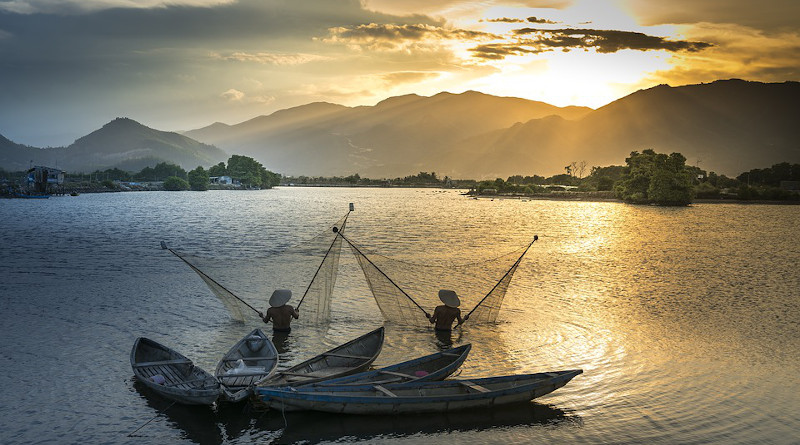UNCLOS Remains The Gold Standard In Maritime Security Cooperation – OpEd
By James Borton
“Oceans may be our shared heritage and lifeline for international trade, but the sea has always proven to be dangerous and insecure,” exclaimed India’s Prime Minister Narenda Modi, the rotational president of the United Nations Security Council, at a recent video conference on maritime security challenges.
From the geopolitical threats of piracy, transnational crime, illegal and unlawful fishing, smuggling, and sovereignty claims to the ecological crucibles of climate change, sea levels, plastics pollution, and degradation of coral reefs, the principles of the 1982 UN Convention of the Law of the Sea (UNCLOS) are at risk.
UNCLOS establishes a comprehensive framework for the regulation of all ocean space and grants coastal state sovereign rights and obligations with respect to marine and seabed resources adjacent to their coasts.
In arguably the most contested maritime region, the South China Sea, where the sea tends to be understood as the stage for geopolitical power projection, key actors from China, Vietnam and also the US, were quick to weigh in on the various assaults on the role of governance and order at sea.
Against this United Nations peace-building backdrop, Vietnam’s Prime Minister, Pham Minh Chinh, emphasized the importance of safeguarding the ocean, the lives of people at sea, and the security of coastal communities.
With its 2,140-mile snaking coastline, Vietnam is one of the most vulnerable countries prone to natural hazards, with its coastal communities experiencing typhoons, storm surges, flooding, coastal erosion, droughts, and salt-water intrusion. These threats are particularly evident in the Mekong Delta, where rising sea levels impact the nation’s rice crops and can easily lead to food insecurity.
In a nod to diplomatic cooperation, the 62-year-old Chinh was quick to extoll the nation’s maritime security mechanisms, bilateral and multilateral, at both the ASEAN and global level. “Maritime security is a global issue and therefore, requires global solutions. We need to take a comprehensive and holistic approach based on cooperation, dialogue and international law to address challenges.”
Additionally, Vietnam signaled its constructive role in helping to develop a network of arrangements and initiatives for regional maritime security with the UN in their capacity as coordinator to bolster information-sharing, especially with regard to preventing marine plastic waste in the oceans and sea.
Vietnam, a former US foe and now comprehensive partner, has taken the diplomatic high road in calling for maritime cooperation to promote dialogue and confidence-building measures among scientists and policy experts. For example, their Diplomatic Academy, a public research university under management of the Ministry of Foreign Affairs, hosted while Vietnam was ASEAN chair in the fall 2020, an ocean data sharing webinar entitled Marine Science: How Science and Technology May Impact on the Good Order of the Sea. Full disclaimer: I was an invited panelist and participated with other panelists on ocean stewardship initiatives that addressed climate change, coral reef destruction, biodiversity loss, pollution (especially plastics), and fisheries depletion.
Hanoi’s maritime security program and expert policy dialogues appear to be succeeding in strengthening international cooperation to address a myriad of geopolitical and environmental challenges, as echoed in Chinh’s video remarks. “Vietnam stands ready to make greater contributions to promoting dialogue and building confidence and joins the international community to make security at sea and to realize the ocean’s enormous potential.”
In sharp contrast, the US and China, in anything but a cooperative and peaceful manner, took repeated shots over the UN bow as they clashed over unlawful, expansive South China Sea maritime claims.
US Secretary of State Antony Blinken responded sharply to China’s increasingly assertive claims to parts of the South China Sea, despite the ruling of an international tribunal five years ago rejecting its claims. He warned China that “conflict there or in any ocean would have serious global consequences for security and commerce.”
The blunt speaking Secretary repeated that the disputed region has seen dangerous encounters between vessels at sea and provocative actions to advance unlawful maritime claims.
His adversary, China’s Deputy Permanent Representative Dai Bing, boldly shouted, “the Security Council is not the right place to discuss the South China Sea issue and that China firmly opposes this act.” In additional volleys, Bing ratcheted up the notes by insisting that “the US is not qualified to make irresponsible remarks on the South China Sea issue.”
While the Law of the Sea Treaty, known as the Third United Nations Convention on the Law of the Sea was adopted in 1982, and one hundred and sixty-two countries, including China and Russia, are signatories to the treaty that governs the world’s oceans. The United States is not.
Ratification of UNCLOS will enable the United States to regain its rightful place in the Pacific and transform rhetoric into action. UNCLOS membership grants Washington the power and credibility to support and promote peaceful resolution of disputes within a rules-based order. To be clear, the US role in maritime security must be coordinated with efforts by the United Nations, donor nations, and nongovernment organizations, (NGOs) since the globally connected economy relies on the oceans that are shared by all.
China is correct about one thing: “the United States hype in the Security Council is entirely politically motivated.” Washington does have a direct stake in freedom of navigation in the South China Sea and in regional stability more generally, including the peaceful resolution of disputes.
In a prompt to all parties, let’s give credit to Vietnam for reminding us that the sea and ocean are a great resource for humanity, the lifeblood of international trade, and a gateway to nations connecting.
The views expressed in this article are those of the authors alone and do not necessarily reflect those of Geopoliticalmonitor.com

